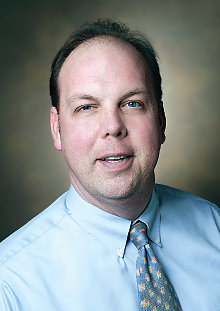From Just Surviving, ICU Physicians Turn Focus to Survivorship
Abstract
New centers at institutions like Indiana and Vanderbilt universities are providing models of collaborative care systems to treat the functional, cognitive, and behavioral problems facing critical care survivors.
No one wants to end up in an intensive care unit (ICU), but thanks to advances in critical care medicine, more and more of the roughly 50,000 patients who visit an ICU every day are surviving.
However, surviving does not necessarily equate to thriving.

Babar Khan, M.D., heads the Eskenazi Health Critical Care Recovery Center in Indiana, one of the first centers focused on the complete physical, cognitive, and psychological recovery of ICU survivors.
A few years back, that distinction started becoming clear for Babar Khan, M.D., an assistant professor of medicine at Indiana University (IU) School of Medicine and a researcher at the IU Center for Aging Research.
“I work in both the ICU and in a pulmonary clinic, and I frequently met with patients who had been discharged from critical care in the clinic,” he said. “And I began to realize that for many of these patients, their lungs were not the most severe problem. They couldn’t sleep, they felt depressed and stressed, and they were forgetful; these were the problems that were most impacting their ability to work and their relationships at home.”
“Later, I was communicating with my colleague Malaz Boustani, who runs a geriatric clinic at IU that focuses on memory and late-life depression, and he told me that my patients sounded a lot like his who had early stage Alzheimer’s, which was interesting.”
The ICU survivors were dealing with post-intensive care syndrome (PICS), a term coined in 2012 to help physicians become more aware of the numerous mental issues—depression, anxiety, posttraumatic stress disorder, and cognitive impairment—that cluster in this patient population along with physical frailty, much as they do in the elderly.
“However, it’s one thing to develop these impairments at 75 or 80 years of age; society has infrastructure in place to help deal with that,” Khan told Psychiatric News. “But imagine you’re 40, and all of a sudden you get a bad pneumonia, and you need to be on a ventilator for two weeks. Next thing you know, you wake up weak, with little memory, and you can no longer function at your job. It is a unique situation, and not one many hospitals in the U.S. have thought about,” Khan continued. “So I thought, why not take some of what we know in the geriatric population and develop a collaborative model over here?”
What resulted out of many subsequent meetings and brainstorming sessions among various interested parties was the Eskenazi Health Critical Care Recovery Center (CCRC)—a new model of care focusing on the complete physical, cognitive, and psychological recovery of ICU survivors.
The CCRC is a patient-focused clinic that provides a comprehensive assessment of each new patient followed by a meeting of the patient, physician, caregiver, nurse, and social worker to work on a personalized care plan. Through a series of follow-up visits, the team monitors patient progress and modifies the treatment program as needed.
Since opening in summer 2011, the CCRC has been making strides; in an evaluation of 24 early patients, improvements were seen in all facets of recovery between the first and second clinic visits, which were about two and a half months apart.
Khan, who is the medical director of the CCRC, is always thinking ahead, as he sees the CCRC as a dynamic entity. For example, the early evaluation showed that functional and cognitive scores improved faster than psychological ones, so he added some emphasis toward treating mood disorders, including adding a clinician trained in cognitive-behavioral therapy to the CCRC team.
“I think the great potential of this center is that it will enable us to incorporate new advances into the care program quickly and help patients when they need it most,” Khan said. “Normally, it takes years for research discoveries to make their way into routine clinical practice, but we are able to implement strategies for our patients, monitor them over short intervals, and see what works and what needs to be modified. It gives us an opportunity to run a clinical and research program in parallel.”

“Right now, more than two-thirds of ICU patients will develop delirium, and it’s one of the biggest risk factors for future cognitive problems,” says James Jackson, M.D., of Vanderbilt’s ICU Recovery Center.
As a relatively new area of focus, though, comprehensive ICU care still faces growing pains. “Clinicians in neurointensive care are geared toward appreciating the cognitive impacts their patients will face, but those who work in surgical or medical ICUs aren’t wired that way yet,” said James Jackson, M.D., a neuropsychologist and assistant director of the ICU Recovery Center at Vanderbilt University Medical Center.
Like IU’s CCRC, the Recovery Center, which opened in 2012, is a new endeavor, though Jackson and other interested clinicians have been exploring collaborative ICU care as part of Vanderbilt’s ICU Delirium and Cognitive Impairment Study for almost 15 years now.
“At this point we have a robust understanding of what problems ICU survivors face and where the gaps in our treatment paradigms lie,” Jackson said. “As for filling those gaps, I think we’re still learning as we go.”
At Vanderbilt, the ICU team takes a two-headed approach, focusing on both post-ICU treatments like cognitive rehabilitation—adapted from programs developed for veterans recovering from brain injury or stroke—and prevention. As implied in the study group name, delirium, a temporary brain failing that causes confusion, is a major priority. “Right now, more than two-thirds of ICU patients will develop delirium, and it’s one of the biggest risk factors for future cognitive problems,” Jackson said.
He noted that preventive measures are important as clinicians currently face a big practical challenge in identifying the right level of intervention for effective cognitive recovery at the earliest post-ICU stages.
“Right after patients wake up, they’re often weak to the point they barely walk or even pick up a pencil,” said Jackson. “But it’s also a critical time in helping their minds recover. So the goal is finding an approach that can be modest in delivery but still effective.”
Another conundrum related to the physical frailty of ICU survivors involves making sure they can participate in regular visits to a recovery clinic. Because these patients sometimes arrive at the ICU from places hours away via emergency airlifts, both Jackson and Khan believe telehealth strategies, through phones or video outlets like Skype, will be a key component if collaborative ICU recovery hopes to grow nationwide.
Khan and Jackson, as well as other members of the IU and Vanderbilt ICU centers, are doing their part to help spur this growth, as they regularly host people who are interested in setting up their own centers and travel to other universities to provide guidance.
“Every center will have a slightly different bent based on its resources and critical care specialties,” Khan said. He noted that in addition to domestic institutes he’s received queries about ICU care from far off places like Iran and Turkey. “But we definitely see the CCRC as a prototype for other health care systems.”
While Jackson is also optimistic about the growth of collaborative ICU centers, he acknowledges that they still may be limited to select academic medical centers. “Education remains very important—educating primary care doctors and patients about the type and magnitude of problems a critical care survivor will face.”
“Not everyone may get a comprehensive recovery program, but even little things like talking with a patient and providing some validation can help,” Jackson continued. “Our team gets dozens of emails each month from patients who are grateful just knowing that their PTSD is a common problem many ICU people deal with, and they’re not going crazy.” ■



